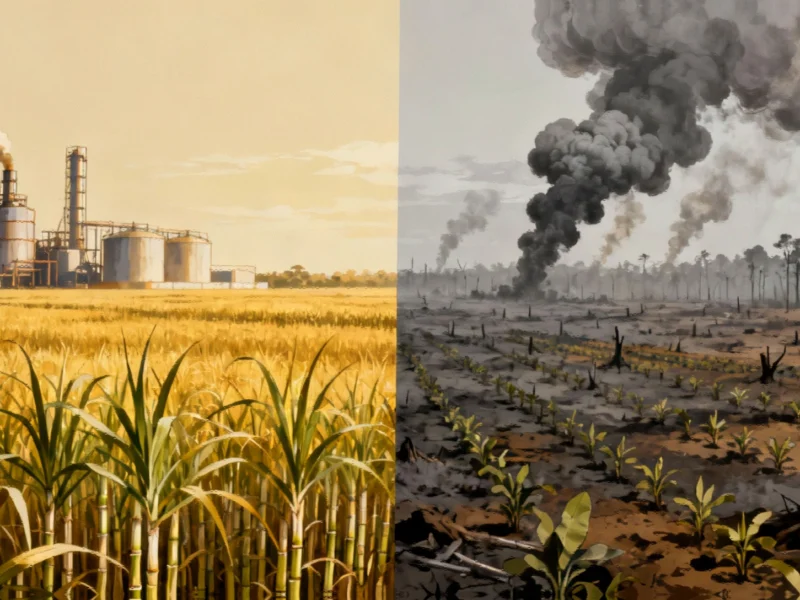Brazil Proposes Quadrupling Biofuels Despite Environmental Warnings
Brazil is preparing to present a controversial global biofuel expansion plan at next month’s climate conference, calling for a fourfold increase in worldwide biofuel usage by 2034, according to documents obtained by The Guardian. The proposal comes despite mounting evidence from environmental groups showing that biofuels may actually increase carbon emissions compared to fossil fuels they’re meant to replace. This development follows Brazil’s ongoing efforts to position itself as a global leader in alternative energy solutions, though critics argue the plan could have devastating ecological consequences.
The leaked draft pledge, intended for world leaders gathering in Belém, Brazil, reveals the country’s ambitious push to dramatically scale up biofuel production globally. As the world’s second-largest ethanol producer, Brazil argues in the document that biofuels represent a crucial transition away from fossil fuels and benefit both climate and environment. However, the proposal arrives amid growing international scrutiny of biofuel sustainability claims, particularly as nations like Australia faces its own environmental policy challenges regarding climate accountability.
Environmental Costs Versus Climate Benefits
Recent research from the Transport and Environment thinktank presents a starkly different picture from Brazil’s optimistic assessment. Their study, published this month, reveals that biofuels currently generate 16% more CO₂ emissions than the fossil fuels they replace when accounting for indirect farming impacts and deforestation. The analysis further indicates that by 2030, biofuel crops would require land equivalent to the entire size of France, making it the sixth-largest user of arable land globally.
“This pledge involves doubling the world’s supply of biofuels,” said Cian Delaney, biofuels campaigner at T&E. “It’s difficult to imagine a scenario where this doesn’t require more land clearance. Without any commitment from countries to meet the target without clearing more land, this will be devastating for the climate, ecosystems and food security.”
The environmental concerns extend beyond emissions, with the report highlighting that one-fifth of all vegetable oil now goes to power vehicles rather than feeding people, while biofuels require 3,000 liters of water to travel just 100 kilometers. The study also noted that solar panels could generate equivalent energy using only 3% of the land required for biofuels.
International Response and Political Divisions
The proposal has already attracted support from several nations, including Italy and Japan, drawing criticism from climate activists who view this as political convenience rather than genuine environmental leadership. Andreas Sieber of 350.org warned that “so-called ‘sustainable fuels’ must never deflect from the central task: transitioning away from fossil fuels and scaling-up renewables.”
The situation reflects Brazil’s politically divided government, where President Luiz Inácio Lula da Silva leads an uneasy coalition spanning from ambitious environmentalists to staunch agribusiness supporters. This internal tension mirrors global technological divisions, similar to how major tech companies frequently reassess their product strategies based on market and environmental considerations.
Broader Climate Conference Agenda
The leaders’ summit, scheduled for November 6-7 in Belém ahead of the COP30 climate conference, will feature multiple environmental initiatives. The opening day will focus on forest conservation, including a Brazilian-led “Tropical Forests Forever Facility” aiming to raise $125 billion to protect standing forests, supported by the UK and other European governments.
The second day will tackle the contentious energy transition debate, a topic that saw significant opposition from Saudi Arabia during previous climate talks. Despite Saudi efforts to remove the fossil fuel transition from the agenda, Brazilian Environment Minister Marina Silva has pushed for more substantive action. The cybersecurity of such critical international negotiations remains paramount, especially as recent nation-state cyberattacks demonstrate the vulnerability of global infrastructure.
Technological Alternatives and Market Realities
As the biofuel debate intensifies, technology companies continue developing alternative solutions to energy challenges. The contrast between land-intensive biofuels and efficient renewables like solar power highlights the importance of technological innovation in addressing climate change. This parallels developments in other sectors where digital platforms are constantly evolving their interfaces and functionality to meet changing user demands and environmental considerations.
The economic dimensions of the energy transition also come into sharp focus, with President Lula expected to call for enhanced debt forgiveness for poor countries in exchange for environmental protection and clean energy investments. This approach recognizes that financial accessibility remains crucial for widespread adoption of sustainable technologies, much like how strategic pricing in consumer electronics can dramatically increase accessibility to energy-efficient devices.
Looking Toward COP30
As preparations for the full COP30 conference continue, the leaked biofuel proposal underscores the complex balancing act between immediate energy needs and long-term environmental sustainability. The draft pledge specifically stipulates that any biofuel increase must come from “environmentally sustainable sources,” though critics question whether such scaling can occur without significant ecological damage.
The ultimate test will come during the leaders’ discussion of nationally determined contributions (NDCs), where countries must present concrete plans for meeting the Paris Agreement goal of limiting global heating to 1.5°C. How Brazil’s biofuel initiative aligns with this crucial objective will likely determine its reception among the international community and environmental organizations worldwide.
Based on reporting by {‘uri’: ‘theguardian.com’, ‘dataType’: ‘news’, ‘title’: ‘The Guardian’, ‘description’: “Latest news, sport, business, comment, analysis and reviews from the Guardian, the world’s leading liberal voice”, ‘location’: {‘type’: ‘place’, ‘geoNamesId’: ‘2643743’, ‘label’: {‘eng’: ‘London’}, ‘population’: 7556900, ‘lat’: 51.50853, ‘long’: -0.12574, ‘country’: {‘type’: ‘country’, ‘geoNamesId’: ‘2635167’, ‘label’: {‘eng’: ‘United Kingdom’}, ‘population’: 62348447, ‘lat’: 54.75844, ‘long’: -2.69531, ‘area’: 244820, ‘continent’: ‘Europe’}}, ‘locationValidated’: False, ‘ranking’: {‘importanceRank’: 13059, ‘alexaGlobalRank’: 192, ‘alexaCountryRank’: 117}}. This article aggregates information from publicly available sources. All trademarks and copyrights belong to their respective owners.



